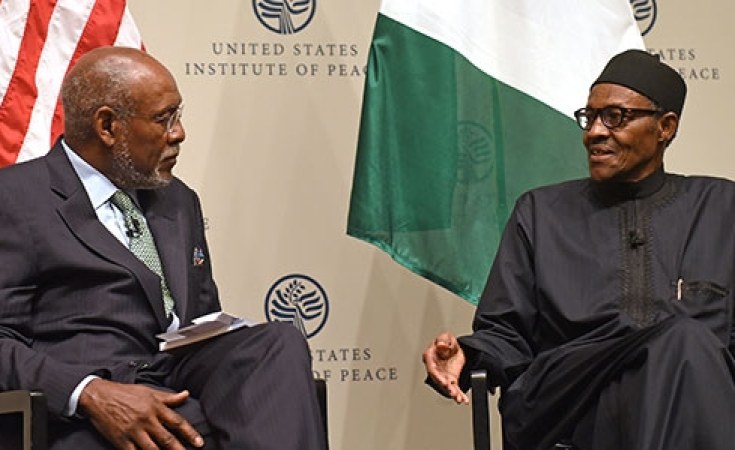Washington, DC — In a well-received speech that largely focused on his desire to address impunity and corruption in his country and to create a “responsive, inclusive, transparent democracy”, President Muhammadu Buhari made a statement that captured most of the media and policy attention.
Speaking at the United States Institute of Peace (USIP), he mis-characterized U.S. legislation known as the ‘Leahy Law’ when he said it “has aided and abetted Boko Haram” by denying the Nigerian government sophisticated weaponry. Much of the subsequent media coverage has perpetuated that misunderstanding.
Our concern is that repeating a flawed interpretation of this vitally important law will undermine it.
The amendment authored by Senator Patrick Leahy in 1997 to the Foreign Assistance Act of 1961 applies solely to military assistance that is funded by the United States government. It protects against tax-payer funding of particular elements of an armed force that the U.S. State Department believes have been credibly implicated in the most serious crimes against the population, in the absence of investigation or action by the recipient government to hold responsible parties accountable.
There is no blanket ban on arms sales or on American assistance to a particular country. Nor does the law affect arms sales paid for by the buyer country.
Therefore, the legislation does not prohibit private sales of American equipment purchased with Nigerian resources. And in the case of U.S.-funded assistance, the legislation requires a unit-by-unit assessment at the battalion or brigade level, rather than a total ban on military aid.
Most importantly, the law’s intent – to hold military forces responsible for their actions – supports President Buhari’s own stated objective of making Nigerian forces accountable to the rule of law. As he has noted, a disciplined, accountable military will do more to end the predations of Boko Haram than undisciplined forces can achieve. The Leahy Law supports this conviction and seeks to provide incentives for internal accountability.
Origins of the ‘Leahy Law’
The Leahy Law originally focused on U.S. assistance to Colombian armed forces. The Vermont senator wrote the amendment to the foreign assistance act after learning that several Colombian army units that massacred poor civilians had been receiving aid and training from the United States. Instead of cutting off all U.S. aid to Colombian police and military, who were then engaged in fighting two insurgencies as well as combatting narco-traffickers, the law distinguished among various elements in those forces.
The amendment prohibited assistance to particular Colombian security force units – battalions or brigades – that the U.S. State Department believed had committed gross violations of basic human rights. It withheld such assistance until the Colombian government investigated the crimes and held the responsible members of the units accountable.
The law has been expanded over the years and now prevents the U.S. government from funding foreign military or police units anywhere in the world if the U.S. government believes those particular units have engaged in the worst human rights violations.
How Does ‘Leahy’ affect Nigeria?
In his USIP speech, President Buhari said that the Leahy Law “has denied us access to appropriate strategic weapons to prosecute the war against the insurgents. In the face of abduction of innocent school girls from their hostels, indiscriminate bombings of civilians in markets and places of worship, our forces have remained largely impotent because they do not possess the appropriate weapons and technology which they could have had, had the so-called human rights violations not been an obstacle.”
It should be emphasized again that the Leahy Law only applies to assistance being drawn from the U.S. Treasury. In the case of Nigeria, it seeks to ensure that U.S. taxpayers are not being asked to fund military and police units that have been have credibly been implicated in rape, prison shootings, executions, and razing villages to the ground. Those units could not receive U.S. funds until the Nigerian government investigates and brings the responsible parties to justice.
Equally important, by restoring assistance to units that have committed such acts – after their government investigates and holds the responsible parties accountable – the law seeks to encourage professionalism and accountability in U.S. partners’ armed forces.
Moreover, in 2014 the United States provided Nigeria with at least $5 million in grant military assistance, all of which was subject to Leahy Law screening. The previous year, 187 Nigerian military units and 173 Nigerian police units – including those most likely to conduct a rescue operation – were vetted and cleared to receive U.S. assistance.
Decisions by the Obama Administration to refrain from selling certain U.S. weapons or technologies to the previous Nigerian administration of President Goodluck Jonathan may have been due to concerns about the human rights record of Nigerian forces or about corruption, but those decisions were independent of the Leahy Law.
Testifying before the U.S. Senate in February, Secretary of State John Kerry said that the limiting factors on U.S.assistance to Nigeria “have to do with governance itself, choices in the military, leadership…and other problems…not the Leahy Law.”
During his Washington visit, President Buhari appealed directly to the Obama Administration and Congress “to examine how the U.S. Government can provide us with far more substantial counter-terrorism assistance with minimal strings. The longer we delay, the deadlier the Boko Haram gets.”
In a statement, Senator Leahy said the law “provides the necessary flexibility to allow the U.S. to advance its foreign policy objectives” despite human rights violations within a country. “In addition, it gives foreign governments an incentive to correct the problem: U.S. aid can resume if they bring to justice people who commit such crimes.”
The ‘Leahy Law’ can help President Buhari in his effort to combat Boko Haram by helping ensure that Nigerian forces operate as professional soldiers and law officers and that they are seen as accountable to the law.
The authors are Senior Policy staff at Open Society Foundations.


